- Home
- Tennessee Williams
A Streetcar Named Desire
A Streetcar Named Desire Read online
A Streetcar Named Desire
Tennessee Williams
It is a very short list of 20th-century American plays that continue to have the same power and impact as when they first appeared—57 years after its Broadway premiere, Tennessee Williams' A Streetcar Named Desire is one of those plays. The story famously recounts how the faded and promiscuous Blanche DuBois is pushed over the edge by her sexy and brutal brother-in-law, Stanley Kowalski. Streetcar launched the careers of Marlon Brando, Jessica Tandy, Kim Hunter and Karl Malden, and solidified the position of Tennessee Williams as one of the most important young playwrights of his generation, as well as that of Elia Kazan as the greatest American stage director of the '40s and '50s.
Who better than America's elder statesman of the theater, Williams' contemporary Arthur Miller, to write as a witness to the lightning that struck American culture in the form of A Streetcar Named Desire? Miller's rich perspective on Williams' singular style of poetic dialogue, sensitive characters, and dramatic violence makes this a unique and valuable new edition of A Streetcar Named Desire. This definitive new edition will also include Williams' essay "The World I Live In," and a brief chronology of the author's life.
A Streetcar Named Desire
by
Tennessee Williams
And so it was I entered the broken world
To trace the visionary company of love, its voice
An instant in the wind (I know not whither hurled)
But not for long to hold each desperate choice
"The Broken Tower" by Hart Crane
An Introduction by the Author
On A Streetcar Named Success by Tennessee Williams
(Copyright, 1947, by The New York Times)
(This essay appeared in The New York Times Drama Section, November 30, 1947--four days before the New York opening of A Streetcar Named Desire.)
Sometime this month I will observe the third anniversary of the Chicago opening of "The Glass Menagerie," an event which terminated one part of my life and began another about as different in all external circumstances as could be well imagined. I was snatched out of virtual oblivion and thrust into sudden prominence, and from the precarious tenancy of furnished rooms about the country I was removed to a suite in a first-class Manhattan hotel. My experience was not unique. Success has often come that abruptly into the lives of Americans.
No, my experience was not exceptional, but neither was it quite ordinary, and if you are willing to accept the somewhat eclectic proposition that I had not been writing with such an experience in mind--and many people are not willing to believe that a playwright is interested in anything but popular success--there may be some point in comparing the two estates.
The sort of life which I had had previous to this popular success was one that required endurance, a life of clawing and scratching along a sheer surface and holding on tight with raw fingers to every inch of rock higher than the one caught hold of before, but it was a good life because it was the sort of life for which the human organism is created. I was not aware of how much vital energy had gone into this struggle until the struggle was removed. I was out on a level plateau with my arms still thrashing and my lungs still grabbing at air that no longer resisted. This was security at last.
I sat down and looked about me and was suddenly very depressed. I thought to myself, this is just a period of adjustment. Tomorrow morning I will wake up in this first-class hotel suite above the discreet hum of an East Side boulevard and I will appreciate its elegance and luxuriate in its comforts and know that I have arrived at our American plan of Olympus. Tomorrow morning when I look at the green satin sofa I will fall in love with it. It is only temporarily that the green satin looks like slime on stagnant water. But in the morning the inoffensive little sofa looked more revolting than the night before and I was already getting too fat for the $125 suit which a fashionable acquaintance had selected for me. In the suite things began to break accidentally. An arm came off the sofa. Cigarette burns appeared on the polished surfaces of the furniture. Windows were left open and a rainstorm flooded the suite. But the maid always put it straight and the patience of the management was inexhaustible. Late parties could not offend them seriously. Nothing short of a demolition bomb seemed to bother my neighbors. I lived on room-service. But in this, too, there was a disenchantment. Sometime between the moment when I ordered dinner over the 'phone and when it was rolled into my living room like a corpse on a rubber-wheeled table, I lost all interest in it. Once I ordered a sirioin steak and a chocolate sundae, but everything was so cunningly disguised on the table that I mistook the chocolate sauce for gravy and poured it over the sirloin steak.
Of course all this was the more trivial aspect of a spiritual dislocation that began to manifest itself in far more disturbing ways. I soon found myself becoming indifferent to people. A well of cynicism rose in me. Conversations all sounded like they had been recorded years ago and were being played back on a turntable. Sincerity and kindliness seemed to have gone out of my friends' voices. I suspected them of hypocrisy. I stopped calling them, stopped seeing them. I was impatient of what I took to be inane flattery.
I got so sick of hearing people say, "I loved your play!" that I could not say thank you any more. I choked on the words and turned rudely away from the usually sincere person. I no longer felt any pride in the play itself but began to dislike it, probably because I felt too lifeless inside ever to create another.
I was walking around dead in my shoes, and I knew it but there was no one I knew or trusted sufficiently, at that time, to take him aside and tell him what was the matter. This curious condition persisted about three months, tll late spring, when I decided to have another eye operation, mainly because of the excuse it gave me to withdraw from the world behind a gauze mask. It was my fourth eye operation, and perhaps I should explain that I had been afflicted for about five years with a cataract on my left eye which required a series of needling operations and finally an operation on the muscle of the eye. (The eye is still in my head. So much for that.) Well, the gauze mask served a purpose. While I was resting in the hospital the friends whom I had neglected or affronted in one way or another began to call on me and now that I was in pain and darkness, their voices seemed to have changed, or rather that unpleasant mutation which I had suspected earlier in the season had now disappeared and they sounded now as they used to sound in the lamented days of my obscurity. Once more they were sincere and kindly voices with the ring of truth in them.
When the gauze mask was removed I found myself in a readjusted world. I checked out of the handsome suite at the first-class hotel, packed my papers and a few incidental belongings and left for Mexico, an elemental country where you can quickly forget the false dignities and conceits imposed by success, a country where vagrants innocent as children curl up to sleep on the pavements and human voices, especially when their language is not familiar to the ear, are soft as birds'. My public self, that artifice of mirrors, did not exist here and so my natural being was resumed.
Then, as a final act of restoration, I settled for a while at Chapala to work on a play called "The Poker Night," which later became "A Streetcar Named Desire." It is only in his work that an artist can find reality and satisfaction, for the actual world is less intense than the world of his invention and consequently his life, without recourse to violent disorder, does not seem very substantial. The right condition for him is that in which his work is not only convenient but unavoidable. This is an over-simplification. One does not escape that easily from the seductions of an effete way of life. You cannot arbitrarily say to yourself, I will now continue my life as it was before this thing. Success happened to me. But once you fully apprehend the vac
uity of a life without struggle you are equipped with the basic means of salvation. Once you know this is true, that the heart of man, his body and his brain, are forged in a white-hot furnace for the purpose of conflict (the struggle of creation) and that with the conflict removed, the man is a sword cutting daisies, that not privation but luxury is the wolf at the door and that the fangs of this wolf are all the little vanities and conceits and laxities that Success is heir to--why, then with this knowledge you are at least in a position of knowing where danger lies.
You know, then, that the public Somebody you are when you "have a name" is a fiction created with mirrors and that the only somebody worth being is the solitary and unseen you that existed from your first breath and which is the sum of your actions and so is constantly in a state of becoming under your own volition--and knowing these things, you can even survive the catastrophe of Success!
It is never altogether too late, unless you embrace the Bitch Goddess, as William James called her, with both arms and find in her smothering caresses exactly what the homesick little boy in you always wanted, absolute protection and utter effortlessness. Security is a kind of death, I think, and it can come to you in a storm of royalty checks beside a kidney-shaped pool in Beverly Hills or anywhere at all that is removed from the conditions that made you an artist, if that's what you are or were or intended to be. Ask anyone who has experienced the kind of success I am talking about--What good is it? Perhaps to get an honest answer you will have to give him a shot of truth-serum but the word he will finally groan is unprintable in genteel publications.
Then what is good? The obsessive interest in human affairs, plus a certain amount of compassion and moral conviction, that first made the experience of living something that must be translated into pigment or music or bodily movement or poetry or prose or anything that's dynamic and expressive--that's what's good for you if you're at all serious in your aims. William Saroyan wrote a great play on this theme, that purity of heart is the one success worth having. "In the time of your life--live!" That time is short and it doesn't return again. It is slipping away while I write this and while you read it, and the monosyllable of the clock is Loss, Loss, Loss, unless you devote your heart to its opposition.
SCENE ONE
The exterior of a two-story corner building on a street in New Orleans which is named Elysian Fields and runs between the L & N tracks and the river. The section is poor but, unlike corresponding sections in other American cities, it has a raffish charm. The houses are mostly white frame, weathered gray, with rickety outside stairs and galleries and quaintly ornamented gables. This building contains two flats, upstairs and down. Faded white stairs ascend to the entrances of both.
It is first dark of an evening early in May. The sky that shows around the dim white building is a peculiarly tender blue, almost a turquoise, which invests the scene with a kind of lyricism and gracefully attenuates the atmosphere of decay. You can almost feel the warm breath of the brown river beyond the river warehouses with their faint redolences of bananas and coffee. A corresponding air is evoked by the music of Negro entertainers at a barroom around the corner. In this part of New Orleans you are practically always just around the corner, or a few doors down the street, from a tinny piano being played with the infatuated fluency of brown fingers. This "Blue Piano" expresses the spirit of the life which goes on here.
Two women, one white and one colored, are taking the air on the steps of the building. The white woman is Eunice, who occupies the upstairs flat; the colored woman a neighbor, for New Orleans is a cosmopolitan city where there is a relatively warm and easy intermingling of races in the old part of town.
Above the music of the "Blue Piano" the voices of people on the street can be heard overlapping.
[Two men come around the corner, Stanley Kowalski and Mitch. They are about twenty-eight or thirty years old, roughly dressed in blue denim work clothes. Stanley carries his bowling jacket and a red-stained package from a butcher's. They stop at the foot of the steps.]
STANLEY [bellowing]:
Hey, there! Stella, Baby!
[Stella comes out on the first floor landing, a gentle young woman, about twenty-five, and of a background obviously quite different from her husband's.]
STELLA [mildly]:
Don't holler at me like that. Hi, Mitch.
STANLEY:
Catch!
STELLA:
What?
STANLEY:
Meat!
[Be heaves the package at her. She cries out in protest but manages to catch it; then she laughes breathlessly. Her husband and his companion have already started back around the comer.]
STELLA [calling after him]:
Stanley! Where are you going?
STANLEY:
Bowling!
STELLA:
Can I come watch?
STANLEY:
Come on.
[He goes out.]
STELLA:
Be over soon.
[To the white woman]
Hello, Eunice. How are you?
EUNICE:
I'm all right. Tell Steve to get him a poor boy's sandwich 'cause nothing's left here.
[They all laugh; the colored woman does not stop. Stella goes out.]
COLORED WOMAN:
What was that package he th'ew at 'er?
[She rises from steps, laughing louder.]
EUNICE:
You hush, now!
NEGRO WOMAN:
Catch what!
[She continues to laugh. Blanche comes around the corner, currying a valise. She looks at a slip of paper, then at the building, then again at the slip and again at the building. Her expression is one of shocked disbelief. Her appearance is incongruous to this setting. She is daintily dressed in a white suit with a fluffy bodice, necklace and earrings of pearl, white gloves and hat, looking as if she were arriving at a summer tea or cocktail party in the garden district. She is about five years older than Stella. Her delicate beauty must avoid a strong light. There is something about her uncertain manner, as well as her white clothes, that suggests a moth.]
EUNICE [finally]:
What's the matter, honey? Are you lost?
BLANCHE [with faintly hysterical humor]:
They told me to take a streetcar named Desire, and then transfer to one called Cemeteries and ride six blocks and get off at--Elysian Fields!
EUNICE:
That's where you are now.
BLANCHE:
At Elysian Fields?
EUNICE:
This here is Elysian Fields.
BLANCHE:
They mustn't have understood what number I wanted.
EUNICE:
What number you lookin' for?
[Blanche wearily refers to the slip of paper.]
BLANCHE:
Six thirty-two.
EUNICE:
You don't have to look no further.
BLANCHE [uncomprehendingly]:
I'm looking for my sister, Stella DuBois. I mean--Mrs. Stanley Kowalski.
EUNICE:
That's the party.--You just did miss her, though.
BLANCHE:
This--can this be--her home?
EUNICE:
She's got the downstairs here and I got the up.
BLANCHE:
Oh. She's--out?
EUNICE:
You noticed that bowling alley around the corner?
BLANCHE:
I'm--not sure I did.
EUNICE:
Well, that's where she's at, watchin' her husband bowl.
[There is a pause]
You want to leave your suitcase here an' go find her?
BLANCHE:
No.
NEGRO WOMAN:
I'll go tell her you come.
BLANCHE:
Thanks.
NEGRO WOMAN:
You welcome.
[She goes out.]
EUNICE:
She wasn't expecting you?
&nbs
p; BLANCHE:
No. No, not tonight.
EUNICE:
Well, why don't you just go in and make yourself at home till they get back.
BLANCHE:
How could I--do that?
EUNICE:
We own this place so I can let you in.
[She gets up and opens the downstairs door. A light goes on behind the blind, turning it light blue. Blanche slowly follows her into the downstairs flat. The surrounding areas dim out as the interior is lighted.]
[Two rooms can be seen, not too clearly defined. The one first entered is primarily a kitchen but contains a folding bed to be used by Blanche. The room beyond this is a bedroom. Off this room is a narrow door to a bathroom.]
EUNICE [defensively, noticing Blanche's look]:
It's sort of messed up right now but when it's clean it's real sweet.
BLANCHE:
Is it?
EUNICE:
Uh, huh, I think so. So you're Stella's sister?
BLANCHE:
Yes.
[Wanting to get rid of her]
Thanks for letting me in.
EUNICE:
Por nada, as the Mexicans say, por nada! Stella spoke of you.
BLANCHE:
Yes?
EUNICE:
I think she said you taught school.
BLANCHE:
Yes.
EUNICE:
And you're from Mississippi, huh?
BLANCHE:
Yes.
EUNICE:
She showed me a picture of your home-place, the plantation.
BLANCHE:
Belle Reve?
EUNICE:
A great big place with white columns.
BLANCHE:
Yes...
EUNICE:
A place like that must be awful hard to keep up.
BLANCHE:
If you will excuse me. I'm just about to drop.
EUNICE:
Sure, honey. Why don't you set down?
BLANCHE:
What I meant was I'd like to be left alone.
EUNICE:
Aw. I'll make myself scarce, in that case.

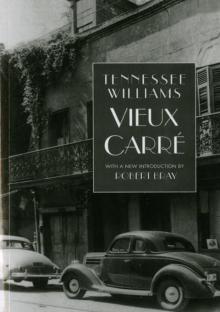 Vieux Carre
Vieux Carre The Night of the Iguana
The Night of the Iguana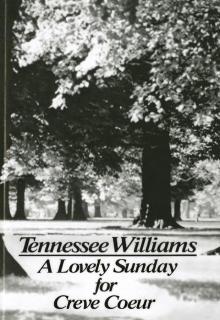 A Lovely Sunday for Creve Coeur
A Lovely Sunday for Creve Coeur Sweet Bird of Youth
Sweet Bird of Youth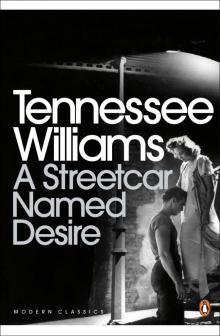 Streetcar Named Desire
Streetcar Named Desire The Milk Train Doesn't Stop Here Anymore
The Milk Train Doesn't Stop Here Anymore Crazy Night
Crazy Night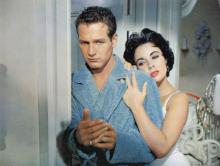 Three Plays of Tennessee Williams
Three Plays of Tennessee Williams A House Not Meant to Stand
A House Not Meant to Stand 27 Wagons Full of Cotton and Other Plays
27 Wagons Full of Cotton and Other Plays Tales of Desire
Tales of Desire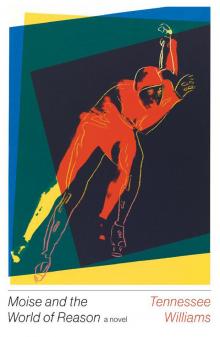 Moise and the World of Reason
Moise and the World of Reason The Traveling Companion & Other Plays
The Traveling Companion & Other Plays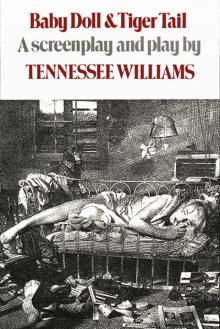 Baby Doll Tiger Tail: A Screenplay and Play by Tennessee Williams
Baby Doll Tiger Tail: A Screenplay and Play by Tennessee Williams Memoirs
Memoirs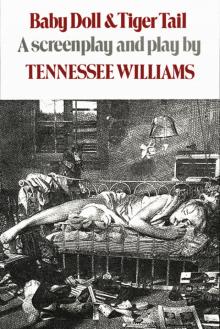 Baby Doll & Tiger Tail
Baby Doll & Tiger Tail Crazy Night (A Mulholland / Strand Magazine Short)
Crazy Night (A Mulholland / Strand Magazine Short)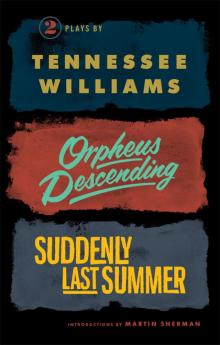 Orpheus Descending and Suddenly Last Summer
Orpheus Descending and Suddenly Last Summer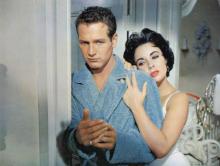 Three Plays
Three Plays The Glass Menagerie
The Glass Menagerie A Streetcar Named Desire
A Streetcar Named Desire